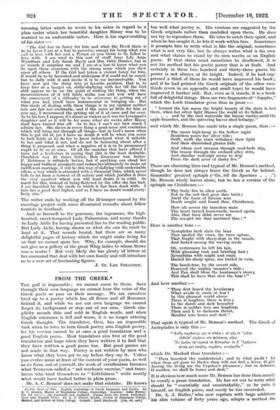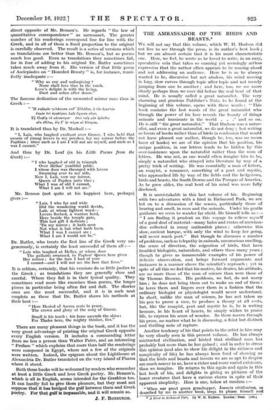FROM THE GREEK.*
THE gulf is impassable ; we cannot come to them. Save :through their own language we cannot hear the voice of the Greek poets or pass on their message. We are ourselves bred up to a poetry which has all Rome and all Romance behind it, and while we use our own language we cannot forget its background or step out of our own. Greek sim- plicity sounds thin and cold in English words, and when English utterance is full and warm, it is no longer uttering Greek thought. The translator, then, has an impossible task when he tries to turn Greek poetry into English poetry, for his version cannot be at once a good translation and a good English poem. Most translators aim first at the good translation and hope when they have written it to find that they have written a good poem too. But good poems are not made in that way. Poetry is not written by men who know what they have got to say before they say it. Unless you evolve some at least of the content of your poem, as well as its form, out of yourself, the work of versification becomes what Tennyson called a "sad .mechanic exercise," and trans- lators who bind themselves to " faithfulness " write mostly what would have looked better in plain prose.
Mr. A. C. Benson' does not make that mistake. He knows
(1) The Reed of Pan. English renderings of Greek Epigrams and Lyrics. By A. C. Benson, Master of Magdalene College, Cambridge. London: John Murray. Pic 6d. net.1—(2) Amaranth and Asphodel. Poems from the Greek Anthology. done into English Verse. By A. S. Butler, D.Litt., Fellow of Brasenose College, aster& and Fellow of Eton College: Oxford; Basil Blackwell. I.1(s. 6d. net.) too well what poetry is. His versions are suggested by the Greek originals rather than modelled upon them. He does not try to reproduce them. He tries to-catch their spirit, and when he has caught it, he lets it work within him. Sometimes it prompts him to write what is like the original, sometimes what is not very like, but he always writes what is his own and what claims to stand by its own merits as an English poem. If that claim must sometimes be disallowed, it is not his method but his poetic power that is at fault. And certainly in these two hundred and thirty-three pieces his power is not always at its height. Indeed, if he had sup- pressed a third of them he would have improved his book ; and if he had printed the Greek originals of the other two- thirds (even in an appendix and small type) he would have improved it further still. But, even as it stands, it is a book full of delightful things. Here are two fragments of" Sappho," which the Loeb translator gives thus in prose :— "Around the fair moon the bright beauty of the stars is lost them, when her silver light illumes the world at its fullest. . . . . and by the cool waterside the breeze rustles amid the apple-branches, and the quivering leaves shed lethargy."
and which Mr. Benson has made into a single poem, thus :—
"The moon high-hung in the hollow night Resistless pours her silver tide ;
Swift, swift the stars withdraw their light And their diminished glories hide.
And where cool streams through reed-beds slip,
The breeze through the orchard alley stirs,
And slumber well-nigh seems to drip From the dark arms of dusky firs.'
Those are charming lines and typical of Mr. Benson's method, though he does not always leave the Greek so far behind. Simonides' greatest epitaph ("Go, tell the Spartans • . .") Mr. Benson wisely leaves alone, but he has a version of the epitaph on Cleisthenes :— " Thy body lies in alien earth,
Not in the soil that gave thee birth ; Amid the foam of Euxine seas Death sought and found thee, Cleisthcncs.
How oft across the homeless main Thy heart turned homewards, turned again. Alas, that thou didst never see The sea-girt isle that nurtured thee -
Here is another tone :— " Xenophilus bath slain the boar
That spoiled the vines, the trees uptore, That fought with sheep-dogs in the meads, And lurked among the waving reeds.
Oh, yestermorn he left his lair, With gleaming tusk and bristling hair ; Xenophilus with might and main Hurled his sharp spear, nor hurled in vain.
The beech-tree, by the covert side, Received the mighty monster's hide ; And Pan shall bless the huntsman's store / This shall he have that slew the boar I"
And here another :—
"Thou dost hoard thy loveliness ; What avails it, more or less ? In this pleasant world above There is laughter, there is love ; In the dumb and dark hereafter There is neither love nor laughter. Thou and I, to darkness thrust, Moulder into bones and dust."
That again is typical of Mr. Benson's method. The Greek of Asclepiades is only this :— "4.ciag rapOevins ml rt aVov ; o6 -yap Fr "Aailv aeoihr' dpilrets rap tatorTa, sip 'Es Auoicrt rà repTva Ta. Kinrpt3or 6, 5' 'Axiporn do-ria !cal trrodln, rapOlve, tutcr64e0a."
which Dr. Mackail thus translates :—
" Thou hoardest thy maidenhood ; and to what prcfit ? foi when thou art gone to Hades thou wilt not find a lover, 0 girl. Among the living are the Cyprian's pleasures ; but in Acheron, 0 maiden, we shall lie bones and dust."
It is obvious how much more Mr. Benson has done than merely to versify a prose translation. He has set out to write what should be "essentially and unmistakably," as he puts it himself, an English poem, and surely he has succeeded.
Dr. A. J. Butler,2 who now reprints with large additions his slim volume of forty years ago, adopts a method the
direct opposite of Mr. Benson's. He regards "the law of quantitative correspondence" as sacrosanct. The greater number of his renderings correspond line for line with the Greek, and in all of them a fixed proportion to the original is carefully observed. The result is a series of versions which as translations are better than Mr. Benson's, but as poems much less good. Even as translations they sometimes fail, for in fear of adding to his original Dr. Butler sometimes takes much away from it. His version of that little poem of Aselepiades on "Hoarded Beauty" is, for instance, mani- festly inadequate :— " Why so coy and unforgiving ?
None shall love thee in the tomb. Love's delight is with the living, Dust and ashes after doom."
The famous dedication of the unwanted mirror runs thus in Greek :—
" 'H crogapiv yeutecura ra0"EXXdan, rbv loithv Evi rpothipots Acts Ixoucra vtalv, Ifa.17) ra ;carom-rpm" hrel ran /ler Opilolat i0eX(0, Oft) r iv reipos o 56vaitag.
It is translated thus by Dr. Mackail :— " I, Lais, who laughed exultant over Greece, I who held that swarm of young lovers in my porches, lay my mirror before the Paphian ; since such as I am I will not see myself, and such as I was I cannot."
And thus by Dr. Leaf (in his Little Poems from the Greek):—
I who laughed of old in triumph
Over Hellas' youthful pride,
I whose door was thronged with lovers Swarming ever to my side,
Now I, Lais, vow my mirror, Queen of Paphos unto thee ; What I was of old I cannot,
What I am I will not see."
Mr. Benson (not quite at his happiest here, perhaps) gives :— "Lais, I who far and wide Did the wondering world deride, Lais, at whose lightest word— Lovers flocked, a wanton herd, Here beside the temple gate, This last gift I dedicate ; 'Tis my mirror ; it bath seen Not what is but what hath been. What I was I cannot see • What I am I would not be."
Dr. Butler, who treats the first line of the Greek very un- generously, is certainly the least successful of them all :—
"Lais who laughed at Hellas, at whose door The gallants swarmed, to Paphos' Queen here gives Her mirror : for the face I had of yore I cannot—and I will not see the face that lives."
It is seldom, certainly, that his versions do so little justice to
the Greek ; as translations they are generally close and careful. Where they 10 is in their lyrical quality. They sometimes read more like exercises than poems, the longer pieces in particular being often flat and dull. The shorter ones are the most successful, and it is in such neat couplets as these that Dr. Butler shows his methods at their best :—
" Here Hesiod or Ascrea rests in peace,
The crown and glory of the song of Greece.
Small is his tomb : his fame ascends the skies : For Males here, the mighty thinker, lies."
There are many pleasant things in the book, and it has the very great advantage of printing the original Greek opposite every English version. It includes a commending letter from no less a person than Walter Pater, and an interesting " Preface " which explains that more than half the renderings were composed in Egypt, where not a few of the originals were written. Indeed, the epigram about the Lighthouse at Alexandria Dr. Butler translated on the very island of Pharos where it stood.
Both these books will be welcomed by readers who remember at least a little Greek and love Greek poetry. Mr. Benson's, which is all in English, seems intended for the Greekless too.
It can hardly fail to give them pleasure, but they must not suppose that it has bridged the gulf between them and Greek
Poetry. For that gulf is impassable, and it will remain so.
J. F. Roantmon.















































 Previous page
Previous page